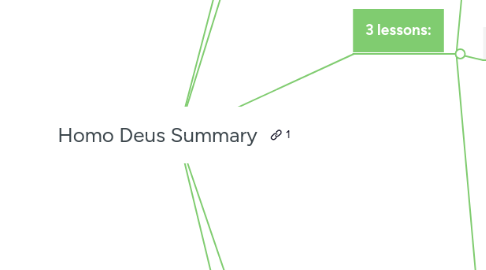
1. 1-Sentence-Summary:
1.1. Homo Deus illustrates the history of the human race from how we came to be the dominant species over what narratives are shaping our lives today all the way to which obstacles we must overcome next to continue to thrive.
2. Favorite quote from the author:
2.1. "This is the best reason to learn history: not in order to predict the future, but to free yourself of the past, and imagine alternative destinies." - Yuval Noah Harari
3. 3 lessons:
3.1. Stories are what make us the strongest animal on the planet.
3.1.1. In democratic elections around the world, millions of people make a concerted effort to agree on choosing a group leader.
3.1.2. They’re one of the best demonstrations of our ability to cooperate on a massive scale. This skill is at the heart of why humans have won the evolutionary race.
3.1.3. But how did we develop it?
3.1.4. According to Harari, it’s rooted in our communication.
3.1.4.1. Humans have told stories since the dawn of speech. Because we can all decide what stories we believe in individually, the best stories win.
3.1.4.2. Over time, we’ve become more intelligent, which is why, usually, the story that wins in the long run is whichever one benefits us the most as a whole.
3.1.5. Take religion, for example.
3.1.5.1. Back in the Middle Ages, the story of Catholicism brought together many European nations in the Crusades. They abandoned the wars they had with one another to fight a larger one.
3.1.5.2. Today, 1,000 years later, we realize that narrative only served a small portion of our population.
3.1.5.3. Therefore, religion is slowly being replaced in more recent generations.
3.2. Today’s dominant narrative is humanism.
3.2.1. Back when the world was less connected, narratives naturally formed regionally.
3.2.2. But nowadays, we’re all aware of the many different religions, political movements, and belief systems around the globe.
3.2.2.1. Thanks to the internet, it’s become obvious to many that there is no one, right choice for any of them.
3.2.3. As a result, the story that dominates the world today is humanism.
3.2.3.1. In this view of the world, humans are the central element and our individual freedom our greatest asset.
3.2.3.2. We believe in science, rationality, progress, technology, and self-actualization.
3.2.4. There are many variants of humanism, and respecting all of them is important, but the most commonly chosen one is liberalism.
3.2.5. Liberalism allows us to express humanism in everyday life by translating its ideas into specific moral codes, laws, and political aspirations.
3.2.5.1. Even campaigns for a certain cause, like climate change awareness, less waste, or redistribution of wealth are often just liberal narratives in disguise.
3.3. All our future narratives involve algorithms, but if we’re not careful, they could replace us altogether.
3.3.1. Since their invention, computers have quickly become a big part of our lives.
3.3.1.1. Often more efficient at performing tasks, they allow us to enjoy more comfort in many areas.
3.3.1.2. Algorithms make our work easier, help us monitor our health, and even contribute to our recreation by giving us more ways to express ourselves.
3.3.2. Therefore, it’s not really a question of whether algorithms will be part of our future, just how.
3.3.3. Two trends Harari sees appearing at the horizon are techno-humanism, often called transhumanism, and dataism.
3.3.3.1. Transhumanism argues that humans should merge with technology to enhance their capabilities and keep up with the power of algorithms.
3.3.3.1.1. This is already manifesting in military technology, athletics, and health, but it also means giving up parts of what makes us human, like empathy.
3.3.3.2. Dataism, on the other hand, suggests we “get out of the way” and let algorithms become as powerful as they can become on their own.
3.3.3.2.1. This might eventually lead to some Matrix-style scenario, in which the machines get rid of us because we’re just in their way.
3.3.4. No one knows which narrative will win and if it’s even one of these two, but one thing’s for sure: the story of humanity will never be boring.
